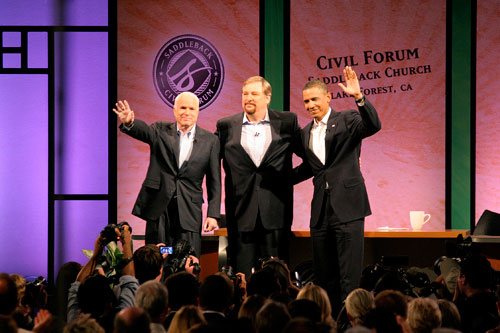Evangelical leaders say presumptive Republican nominee John McCain and Democrat nominee Barack Obama differ sharply on abortion, “gay rights” and the judiciary.
 Presumptive Republican nominee John McCain, left, joins Saddleback Church pastor Rick Warren and presumptive Democratic nominee Barack Obama on stage Aug. 16 during a presidential forum.
Presumptive Republican nominee John McCain, left, joins Saddleback Church pastor Rick Warren and presumptive Democratic nominee Barack Obama on stage Aug. 16 during a presidential forum.The two men appeared on stage separately for one hour each at Saddleback Church in California and were asked nearly identical questions by the congregation’s pastor, Rick Warren. The event was dubbed “the Saddleback Civil Forum on the Presidency.”
Although some pro-family leaders had expressed concern the forum wouldn’t cover hot-button social issues, those fears quickly disappeared minutes into the event when Warren, noting that there have been approximately 40 million abortions since Roe v. Wade, asked Obama, “At what point does a baby get human rights?”
“I think that whether you’re looking at it from a theological perspective or a scientific perspective,” Obama responded, “answering that question with specificity is above my pay-grade.”
Obama added that he believes “there is a moral and ethical element” to the abortion issue but stressed that he is pro-choice.
“I believe in Roe v. Wade, and I come to that conclusion not because I’m pro-abortion, but because, ultimately, I don’t think women make these decisions casually,” he said.
Asked the same question about when a baby gets human rights, McCain said “at the moment of conception.”
“I have a 25-year pro-life record in the Congress [and] in the Senate,” he said. “And as president of the United States, I will be a pro-life president. And this presidency will have pro-life policies.?- That’s my commitment to you.”
Richard Land, president of the Southern Baptist Ethics and Religious Liberty Commission, applauded the format and said he felt “people learned a lot more about” the two candidates than “they’re going to learn in the debates.” He also said the fact that the event took place at a Southern Baptist church with a Southern Baptist pastor asking questions means that there has not been the “decline of evangelical influence” in politics as some have said.
Pro-lifers took issue with two statements Obama made about abortion. At one point he said “abortions have not gone down” even though “we have had a president who is opposed to abortion,” when in fact the abortion rate has fallen during the Bush administration. The pro-choice Guttmacher Institute reported earlier this year that the abortion rate was at its lowest point in three decades. At another point, Obama said women don’t make the decision to have an abortion “casually,” which a separate Guttmacher study seems to refute. The study showed that 86 percent of abortions are made for the sake of convenience. Only 1 percent of women said their abortion was the consequence of rape, and less than 1 percent cited incest.
On other issues, Obama was asked to define marriage and responded by saying it is the “union between a man and a woman.” But he said he would not support a constitutional amendment with that definition.
“Historically, we have not defined marriage in our constitution,” said Obama, who also restated his support for same-sex civil unions. “It’s been a matter of state law.”
It was unclear whether Obama was referring to a proposed marriage amendment in California or a proposed federal marriage amendment, although he opposes both.
McCain said he believes the decision by the California Supreme Court to legalize “gay marriage” was wrong.
“I strongly support preserving the unique status of marriage between man and woman,” he said before stressing his backing of marriage amendments on the state level. McCain’s home state of Arizona will be voting on a marriage amendment in November. “In my state, I hope we will make that decision, and other states, they have [made that decision] to recognize the unique status between man and woman. And that doesn’t mean that people can’t enter into legal agreements. That doesn’t mean that they don’t have the rights of all citizens. I’m not saying that. I am saying that we should preserve the unique status of marriage between one man and one woman.”
McCain voluntarily gave his thoughts on a federal marriage amendment, which he has opposed.
“[I]f a federal court decided that my state of Arizona had to observe what the state of Massachusetts decided [on gay marriage], then I would favor a [federal] constitutional amendment. Until then, I believe the states should make the decisions within their own states.”
Warren also asked each man to name an existing Supreme Court justice they would not have nominated. Obama named Justice Clarence Thomas, a leading conservative on the court.
“I don’t think that he was as strong enough a jurist or legal thinker at the time for that elevation, setting aside the fact that I profoundly disagree with his interpretations of a lot of the Constitution,” Obama said. “I would not nominate Justice Scalia, although I don’t think there’s any doubt about his intellectual brilliance, because he and I just disagree.”
McCain said he would not have nominated Justices Ruth Bader Ginsburg, Stephen Breyer, David Souter and John Paul Stevens, the court’s four most liberal members.
“I think that the President of the United States has incredible responsibility in nominating people to the United States Supreme Court,” McCain said. “This nomination should be based on the criteria of a proven record, of strictly adhering to the Constitution of the United States of America and not legislating from the bench. Some of the worst damage has been done by legislating from the bench.”
Obama and McCain were asked by Warren to describe what their Christian faith means to each of them. Obama responded, “Jesus Christ died for my sins, and that I am redeemed through him.” McCain said, “It means I’m saved and forgiven.”